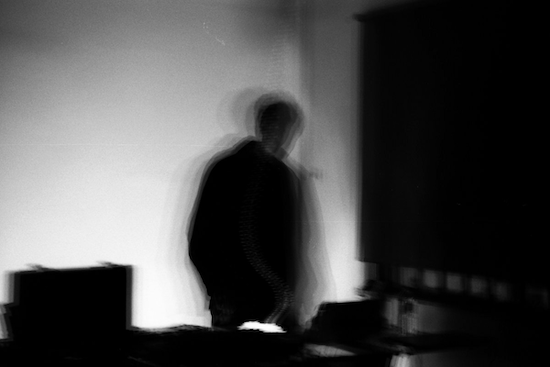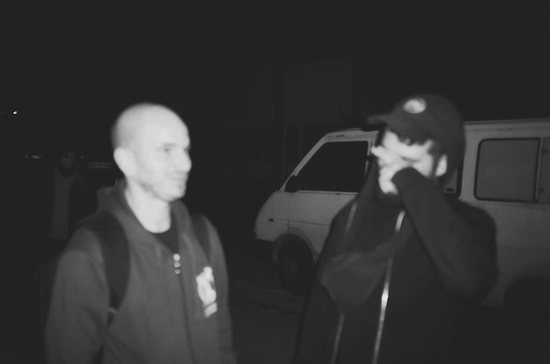Amek Collective, photo by Ivan Shentov
I remember first hearing about Bulgaria in my mother’s stories, who went there on holiday in 1982 when martial law was imposed in Poland. The country’s sunny beaches to our east were appealing, especially if you could get a break from hibernated Poland.
Outside of Bulgaria’s plethora of resorts, when I read articles about the country’s music it is dominated by an emphasis on the incredible folk traditions explored by the Bulgarian State Radio & Television Female Vocal Choir, especially their album Le Mystère des Voix Bulgares, which was released by 4AD almost a decade before my mother was bathing on the shores of the Black Sea. It is hardly surprising that this band has become so engraved in the memory given so few artists from Eastern Europe broke through to the broader consciousness during the Iron Curtain era.
As I write this sitting in Gdańsk, in the north of Poland, I see grim weather outside the window. If it snows, it melts immediately. If the frost intensifies, ice rinks form on the pavements. The last thing you want to do is to leave the house. I have a soundtrack for this situation which I’ve called Dark Drone Bulgaria – heavy, monotonous walls of guitars, electronic passages and field recordings. It’s time-stopping music that grows darker with each listen. Listening to it can bring you down, but at some point, a hidden beauty is revealed.
One of the most important groups on the Bulgarian scene is Amek Collective, who have just celebrated their 15th anniversary. “We started out of necessity more than anything else,” says Martin Lukanov, one of Amek’s founders. In the late 2000s, they were active on the Troniks message board, checking out new noise releases and following a subforum for European tours where they discovered that some of the artists they liked were looking for contacts in Bulgaria. “At that time, there was something like a concert drought in the country, at least when it came to the music we cared about, so we just wrote the touring artists that we’d book them for shows in Sofia. We didn’t know everything that goes into hosting a show; we didn’t have anyone to learn from – we just learned while doing it,” he adds.
At the same time, they were releasing music, working mainly with artists from their home country and taking ambient and drone as their starting point. An excellent summary is the third installment of their bi-annual Vanishing Standards compilation, which includes artists from their established network and welcomes new faces aboard.
“While it is true that we are mainly focused on these genres, there are plenty of genre-bending works in our catalogue,” points out Angel Simitchiev, another collective founder. “We can only hope that a thread runs through most of our records that binds them together and makes them parts of a bigger whole. We need to feel a connection with the work and its author. We want to be involved in the process of putting together a release. Only this way will our activities have actual weight and significance.”

Evitceles, photo by Nikola Kostov
Simitchiev admits that until 2020, things seemed to be improving in the Bulgarian scene, particular in the more niche corners that they inhabited. Unsurprisingly, however, the pandemic took a toll. “It’s not as easy to get interested in both live and recorded experimental music, and there’s less of an audience for the shows we’re interested in booking or attending.”
As I write this piece, news has broken that Koncept Space, one of two main venues in Sofia where Amek has hosted concerts for years, is shutting down, leaving a vast void and a feeling of uncertainty for the future. They’re now down to only one site, Fabrika Avtonomia, a completely DIY and non-profit space where you don’t feel like a visitor but a contributor to a fragile scene. All that’s left otherwise are commercial clubs with high rents and a business-first mentality. “One of the constants through our existence has been the difficulty of finding venues that welcome our type of music,” says Lukanov. “We’ve organised concerts at questionable seedy bars; we’ve been thrown out of venues, banned from places whose owners didn’t even bother to check out the type of music we book or our politics.”
What else is there for left-field Bulgarian music? There are hints in radio shows like Alarma Punk Jazz’ and The Other Side on the Bulgarian National Radio, and Garage on Z-Rock. In recent years, there’s been a slight resurgence in printed zines like Контра Култура and Светло бъдеще, both primarily focused on punk music with articles widely available online, too. However, says Lukanov, “good music journalism is almost non-existent, and the few good writers focus mostly on other genres. Regarding coverage in other languages, the underground music here is pretty much ignored.” That, unfortunately, does not differentiate Bulgaria from the rest of the region.
I ask how Amek sees the music scene from the Central and Eastern European perspective. “I wouldn’t group this part of the continent, as there are way more cultural and historical differences than similarities,” says Lukanov. Simitchiev adds: “Our musical output is not connected to our country or territory of origin. We neither praise nor hate it; we certainly do not romanticise it because there’s not much to be romanticised about it. We’re just here making music we find worth sharing.”
Evitceles – Velvet Room
(Opal Tapes)
I wrote about one of Evitceles’ previous albums a year ago. On his new album released by Opal Tapes, the musician, aka Etien Slavchev builds resonating, steady forms lined with sparse beats and diversely-deployed guitars. At times it recalls Barn Owl, but simultaneously utilises an entirely different palette. Broken beats are tinged with guitar patches that can be either dense or delicate, complemented by hazy vocals. The music unfolds gradually, sometimes reminiscent even of 80s rock, always perfectly crafted.
Adonai Atrophia – Dawah
(self-released)
Based on found samples, field recordings and modular synthesiser, through afterimages of sacred dances, sampled vocals stretched across electronics, and recorded chiefly with analog equipment, Dawah begins with a swirling loop of muddled noise before traversing the realms of dark ambient and post-industrial. A collection of recordings for theatre and compositions taken from various compilations, it nevertheless sounds very coherent, and is at its best when it’s most contemplative. A dark, somewhat spiritual variation on the broader folklore theme.
Сбогом Хиляди (Stogom 1000) – омайна тишина, погълни ме
(self-released)
The electronica of Сбогом Хиляди is full of space, at times twisting subtly into the aesthetic of kosmische musik. If it reaches for drone aesthetics, it treats them only as a starting point and generates stretched-out passages that pile up with bass and indistinct harmonic structures. This music seems to last forever, filled with cinematic and narrative meditation, and yet is developed gradually without drastic changes or transitions. Dense synth strands are boosted by a bass sound which enhances the drama, broken by the introduction of rock-adjacent electric guitar with a tinge of noise and metal.
Born Erased – I Am The End Of The World
(BLWBCK)
As well as leading Amek Collective and previously recording under the now-defunct moniker Mytrip, Angel Simitchiev also operates as Born Erased where he creates hazy guitar structures and a spacious sound, the darkness of which evokes the dystopian visions emphasised on the album cover. Ambience is the basis for a brooding record, in which twisted guitars and booming synths create a deep sense of drama. The suites are interspersed with tape manipulations, cello, and live drums, reminiscent of Ben Frost’s doom metal-tinged output, and demonstrates the brilliant imagination of a musician constantly pushing himself further.
Emilian Gatsov – Mall Womb
(Mahorka)
The Bulgarian label that I look at most regularly after Amek Collective is Mahorka, whose discography includes Mall Womb by Emilian Gatsov. Gastov has recorded over 80 scores for theatre, as well as the soundtrack to the acclaimed short documentary L’immeuble des braves, and Mall Womb maintains that sense of the theatrical and cinematic; it reminds me of that scene in Kubrick’s The Shining when Jack Torrance flashes through the ballroom. Gatsov’s music has a lyrical beauty, pulsating tracks enveloped by choral, childlike vocals, accompanied by vaguely emergent piano passages, and startling cinematic suites that drift between anxiety and emptiness. The darkness is palpable but has a lightness and some lyricism too, the occasional unwritten uplift. Ethereal choirs above the arrangements of the synths, shrouded by an occasional saxophone, build up a solemn mood, much more interesting than more pathos-laden soundtracks.
TDK / ТДК – Nemesta
(self-released)
TDK derive their pedigree from prog rock, but it would be a shame to categorise their album Nemesta exclusively in this genre. On the one hand, the lyrics paint the absurd scenes of everyday life, while on the other, they sometimes approach the heaviness of bands like Swans. There’s a volatility, too, but it remains coherent as well as broad swinging in directions that might evoke bands as broad as Shinning, ZU, The Psychic Paramount or The Mars Volta. They also reference ‘estrada muzika’, a term for popular show music produced in Bulgaria between the 1950s and 1990s. Despite its heaviness, the album is deftly constructed, showing that prog rock can still provide a mine of inspiration.
Voyvoda – Autochthonous (self-released)
(self-released)
Voyvoda emphasise a textural aspect to their music, with lyrics connected to Balkan history, Orthodox Christianity, and their personal family stories. This album was recorded in the aftermath of the full-scale Russian invasion of Ukraine, amid a wider tension across the region. The post punk spirit of the songs sometimes harks back to Fugazi or The Ex, while at the same time the musicians draw on samples to create a cinematic atmosphere somewhere between industrial, metal, and hardcore. A dose of aggression and anger lingers over the album, unleashed in its more pulsating moments in which the band reflect the jitteriness of the modern world through jazz guitar and cascades of percussion.
Valentin Doychinov – Sediments
(self-released)
A schism in Dark Drone Bulgaria! In a dense accumulation of drones, darkness, and heavy guitar one-liners, Valentin Doychinov grabs his electric guitar but plays differently. Instead of creating walls of sounds, he weaves solos and mantric passages in the vein of Daniel Bachman, Tom Carter, and sometimes Raphael Roginski. He usually works under the name V-Stók, generating dark electronica, noise, ambient and post rock. Here, using an electric guitar and looper, he turns towards improvisation and jazz, but above all, open free forms which attract the instrument with a lightness and metallic sound.
V0LAND – Innenraum
(Amek)
Symeon Yovev deploys field recordings and metallic, industrial compositions, which he twists with a vintage sound that adds unique character. Here, jittery tracks transform into resounding and progressively resonant suites, which he then distorts once more. Despite the droning passages, there are a lot of hidden punctuated sounds here, a textural richness that pierces through the strands of post-apocalyptic improvisations emerging from the apparent chaos. This recording is also entirely live, giving it additional value.
Blessed By Saturn – Wasted Heart
(self-released)
I’ve been thinking about the Bulgarian Inner Ear column for a year. Back when I started, I was impressed by Niandraz’s Sumrak album, and now she’s recorded another as Blessed By Saturn. The whole thing is shrouded in that Bulgarian darkness that can be also sensed in many of the releases mentioned, coming in her case from the way she utilised homemade sessions. These multi-layered improvisations are distilled into tracks with a substantial boost from bass and drone, and tinged with subtle electronics. Music of emptiness and space, patience and persistence with an atmosphere that verges on that of a horror film, it sees the artist delving deeper than ever to explore the heaviest emotional states, from which she finds an unexpected beauty.


